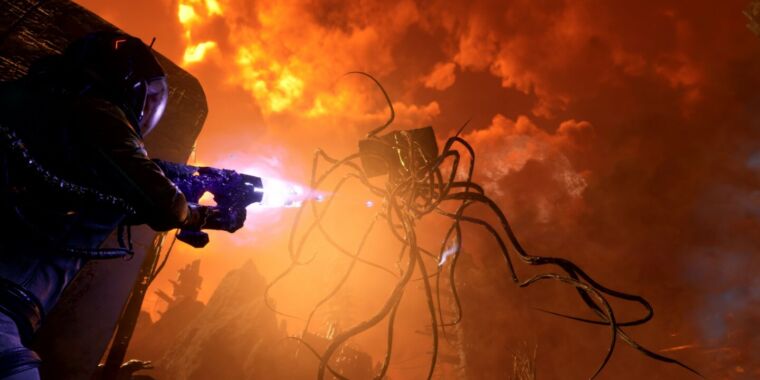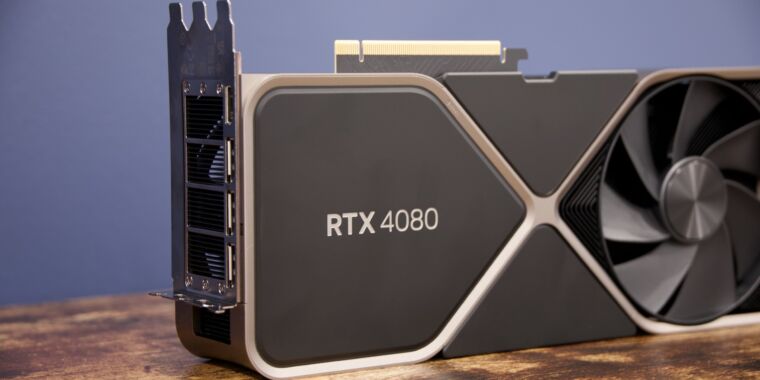Returnal PC trailer
A lesser-known PlayStation 5 game called Returnal is coming to PC, and while it hasn’t had as much fanfare as big-ticket titles like Spider-Man, The Last of Us, or Horizon, it’s definitely one you should try. It’s simultaneously a throwback to classic arcade action games, a PC-style Roguelike, a technical showcase for modern systems, and an homage to the moody science fiction novels and films of the 1970s and 1980s. But most importantly, it’s a good game.
Published by Sony and developed by (now Sony-owned) Finnish studio Housemarque, Returnal was one of the earliest PS5 exclusives when it launched in early 2021, and it was a major step up into the triple-A game big leagues for Housemarque, which had previously released arcade-style games like Super Stardust HD and Resogun.
During The Game Awards on Thursday, Sony announced that, like many of its other recent first-party titles, Returnal will launch on PC with as-yet-unnamed PC-specific enhancements. The port is being handled by Climax Studios, and the release window is “early 2023.”
While it was a PS5 game first, Returnal‘s DNA can be traced to multiple PC gaming traditions—and its themes and aesthetic draw from some of the same background those PC games leaned on, too.
Returnal‘s retro and PC gaming influences
The game’s gimmick, if you will, is that your protagonist is trapped in a time loop akin to the one in the Star Trek: The Next Generation episode “Cause and Effect.” Each time she dies, the cycle starts over, and you’re mostly back to square one. But some of the knowledge you gain (and a very limited number of other character-level improvements) carries on from cycle to cycle, allowing you to win a hard-fought war of attrition against your circumstances through many, many deaths.
The environments, enemies, and loot are (largely) randomized, and the player regularly faces difficult choices with clear pros and cons for each option that will follow them for the rest of the cycle. These are, of course, all the elements of a Roguelike, a genre that goes back to the made-of-ASCII Rogue on personal computers way back in 1980. Rogue went on to inspire multiple genres, including Diablo-style action RPGs.
-
A screenshot of Returnal showing a comparison between the stats of two weapons
Ars Technica -
A screenshot from Returnal showing an optional pick up with negative and positive effects
Ars Technica -
The main pause menu of Returnal
Ars Technica
Returnal borrows significantly from contemporary Roguelikes that have thrived on Steam, in particular games like Nuclear Throne—yet another way it’s firmly in a PC gaming tradition.
Beyond that, Returnal plays like something from a very specific lineage of PC-based third-person shooters—a tradition that includes everything from MDK to Max Payne to Star Wars Jedi Knight: Jedi Academy and Control. Sure, most of those games also came out on consoles, but they always felt most at home on their lead development platform, the PC.
Housemarque is known for making arcade-style games that are inspired by the likes of Galaga, and some of that DNA survives in Returnal, so there’s a hard retro bent here. Basically, if you like retro or PC games, Returnal might have your number—especially if you’re into the science fiction of the 1970s and 1980s, whose influence underpinned many of those classic games.
Aliens, Solaris, and classic sci-fi horror
Ultra-fast-paced action games aren’t usually heavy on atmosphere or even storytelling, but Returnal is an exception. The game draws its aesthetic, themes, and general presentation from moody or horrific science fiction like the Alien films and the works of Russian director Andrei Tarkovsky, who made atmospheric films like Solaris and Stalker.
You spend most of the game battling enemies in grim environments like the decrepit, damp forests of an unknown world or the sandblasted ruins of alien civilizations lost to the innumerable eons. These are conceived more to set a mood—an unsettling vibe even—than to tell an explicit story, but they draw heavily from science fiction horror novels and films of the 1970s and 1980s. The game’s aesthetic has some similarities to more contemporary science films, too, like Edge of Tomorrow and Annihilation.
-
A Returnal screenshot showing a strange statue in an alien ruin
Ars Technica -
A Returnal screenshot showing a tentacled alien in a blood red sky
Ars Technica
The actual storytelling mostly takes place in an eerie rendition of protagonist Selene’s home, somehow generated anachronistically on this alien world. For these scenes, you go into first-person perspective and explore Selene’s life through cryptic and incomplete glimpses. The unsettling oddness of these sequences is clearly inspired by author Stanislaw Lem’s and filmmaker Andrei Tarkovsky’s renditions of Solaris, a story about an unfathomable alien intelligence that communicates with the protagonist by producing baffling, dreamlike renditions of events, places, and people locked away in the annals of his memory.
Some of that feels unusually poignant because the game features a middle-aged female protagonist, which is quite unusual in big-budget video games. It’s an interesting and welcome departure from the default in these sorts of games, and it contributes to the personal nature of the story. There’s also the outstanding soundtrack by Bobby Krlic, which couldn’t possibly be more inspired by Blade Runner. Enough said, right?
Returnal was already a technical showcase
Among other things, the PC gaming platform is about cutting-edge tech. Many games native to the platform more or less exist as showcases for expensive hardware. Returnal was that on PS5, of course—the 60-frames-per-second action game never could have been the same experience on PS4—but it could be that on PC, too.
-
A screenshot of Returnal on PC
Sony -
A screenshot of Returnal on PC
Sony -
A screenshot of Returnal on PC
Sony
Yes, Housemarque claimed some very limited ray tracing for Returnal on PS5, and the maddening complexity and scale of its bullet-hell-esque battles is something you don’t often see in a 3D game with this level of detail and production values. But Housemarque—and by extension, Returnal—is also known for its frankly bonkers particle effects, which are used for things like a transporter that disintegrates the character into thousands of strange, tiny blobs. It’s hard to describe, but when you see it in the game you’re likely to at least say, “Huh, that’s neat.”
Sony, Housemarque, and Climax Studios haven’t detailed what will be unique to the PC version, but we’re hoping for more robust ray-tracing support, Nvidia DLSS or AMD FidelityFX, and more. Also, the game’s ultra-fast-paced, twitchy combat lends itself well to high-refresh-rate monitors. The PS5 supports those, but the PS5 version of Returnal doesn’t, so the PC could be a place for this game to really shine.
One big caveat: Returnal is not for the weak-willed
There’s one reason Returnal might not be a slam dunk with some PC gamers: it’s viciously difficult. The game is about learning from failure, and you will fail many times. The battles can be overwhelming, and small mistakes may be punished with massive damage that’s hard to come back from. Combine that with the fact that some late-game lives last as long as 45 minutes, and you have a potential recipe for frustration.
The game gathered some comparisons to the likes of Dark Souls when it first came out because, well, Dark Souls has become shorthand for “punishingly difficult game.” But in truth, Returnal bears little resemblance to Dark Souls. From Software games like Dark Souls and Elden Ring are difficult, but their worlds and encounters are mostly deterministic, and they’re all about building muscle memory and tactics to respond to clear, recurring patterns.
There’s some of that in Returnal also, but the game has a larger random element. So while players who die in Dark Souls can almost always brush that death off, knowing it was because of a mistake that they can learn from, Returnal can feel capricious and unfair sometimes.
As long as you’re able to accept the premise—that you will die a lot, and sometimes it’s just bad luck—there’s a lot to enjoy. I recommend giving it a shot. Just… brace yourself. Returnal is very challenging. But then again, so were the classic and contemporary games that inspired it.
Listing image by Ars Technica








